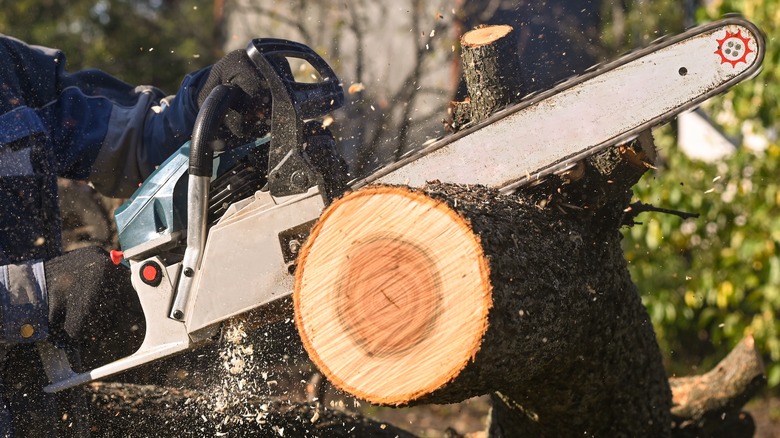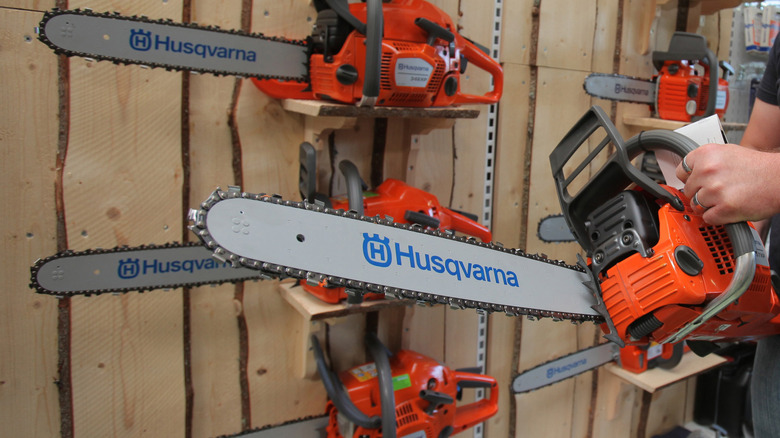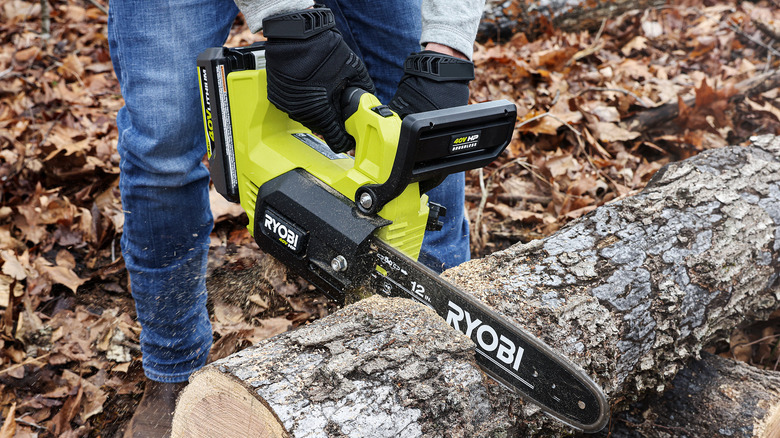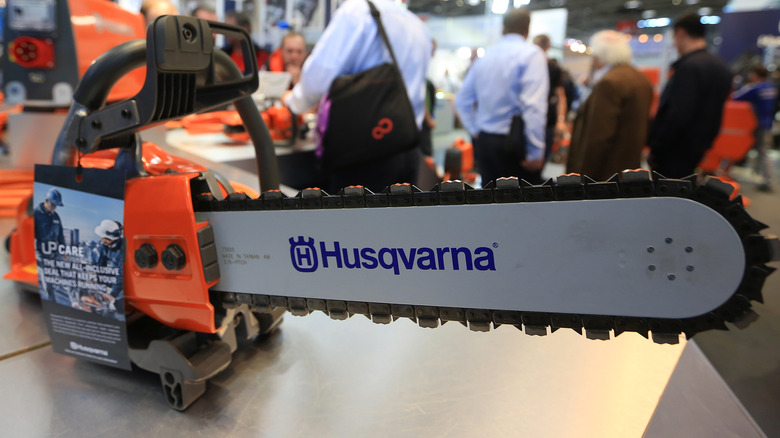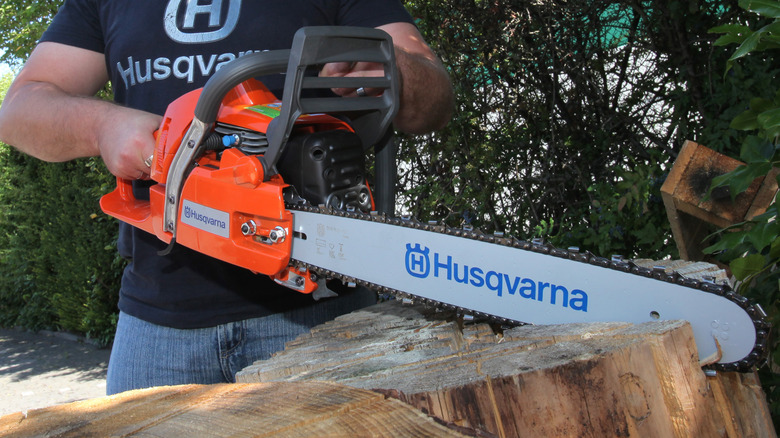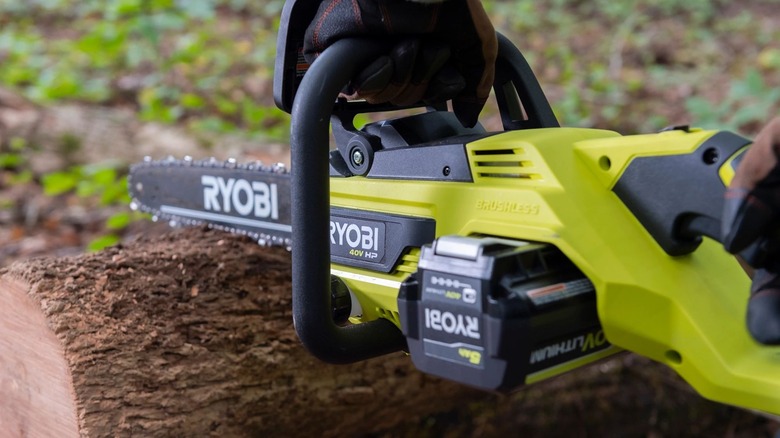Husqvarna VS Ryobi: Who Has The Better Electric Chainsaw
We may receive a commission on purchases made from links.
While chainsaws are mostly associated with the lumber industry (or horror films), they're a power tool that has a wide variety of uses for both professionals and homeowners. They can be used for cutting down trees, of course, but they're also great for making firewood, landscaping particularly thick shrubs and bushes, and more niche applications like ice sculpting.
More and more, electric chainsaws are being used over gas-powered ones, especially as battery technology advances, and they've become formidable tools in their own right. With electric chainsaws, you don't need to worry about keeping gasoline or other fuels on hand, and you don't have to breathe in noxious fumes (that are also bad for the environment). They can also be quieter and lighter — which makes them more convenient to use — since they don't have bulky gas engines and can be easier to store. Electric chainsaws also typically require less maintenance than their gas-powered counterparts.
But which electric chainsaw is right for you? There's no shortage of the tool on the market, and it can come in a wide range of sizes. Several major tool manufacturers sell electric chainsaws, including Husqvarna and Ryobi. Here's how the electric chainsaws made by those two brands stack up against each other, based on specs and hands-on reviews from reputable publications like Pro Tool Reviews and Popular Mechanics.
What is Husqvarna?
Amazingly enough, Husqvarna has been around since the 17th century and was originally founded in Sweden to produce muskets. Since then, it has split off into several big manufacturing companies and makes a wide variety of different mechanical products. Products Husqvarna has made since its founding include hunting weapons, wood and gas stoves, sewing machines, bicycles, and typewriters. Since the early 20th century, the brand has also been well-known for its line of motorcycles.
In 1959, Husqvarna introduced its first motorized chainsaw, 12 years after introducing a motorized lawn mower. Swedish designer Sixten Sason incorporated motorcycle muffler technology into the company's first chainsaw, the Husqvarna 90, making it significantly quieter than models from competing manufacturers. In 1969, the Husqvarna 180 chainsaw incorporated anti-vibration technology for the first time, and four years later, the company introduced the first-ever automatic chain break, which helps prevent kickback-related injuries.
Husqvarna continued to make innovations in chainsaw technology in the decades since. Today, the company sells multiple types of chainsaws, including top-handle models and different chainsaws geared toward professionals and residential landscapers. Several battery-powered models are also available. The company used to produce corded electric chainsaws, but today, all Husqvarna electric chainsaws are cordless and powered by lithium-ion batteries.
What is Ryobi?
For decades, Japanese-based Ryobi Limited has been manufacturing power tools in addition to printing equipment and automotive, electronic, and telecommunication components. Ryobi offers a wide assortment of products, including generators, industrial vacuums, tool storage units, and lifestyle/job site products like fans, heaters, LED lights, and even radios.
Ryobi is best known perhaps for its line of power tools, which are easy to spot in hardware stores across the country thanks to their signature yellow-green hue. They range from large outdoor equipment like riding mowers to simple handheld items like cordless drills. Ryobi caters its products to both professionals and DIY-ers and even supports a community of DIY enthusiasts called Ryobi Nation.
It shouldn't be a surprise then that the company makes an assortment of chainsaws. While Ryobi offers a few traditional, gas-powered models, most of its chainsaws are electric. Most electric chainsaws are also cordless and battery-powered, like many of Ryobi's tools, and use proprietary batteries that are interchangeable with certain other Ryobi products.
Power and size
The smallest Husqvarna electric chainsaws measure 12 inches, and the largest tops out at 18 inches. Ryobi has a wider range when it comes to the size of its electric chainsaws, with its largest model being 20 inches. Its smallest model is just six inches — Pro Tool Reviews calls this particular product "ideal for pruning and light limbing of trees and branches up to four inches in diameter." It wouldn't really be used in the way a larger chainsaw would be, but it is one of the most popular mini chainsaws available.
If you're looking for something lightweight and compact that's still big enough to be used as a traditional chainsaw, Pro Tool Reviews recently named the Ryobi Brushless Whisper Series 12-inch Chainsaw P2570 as "the best small battery-powered chainsaw." It uses an 18-volt battery that can make 112 cuts per charge. If you're looking for more power, Ryobi also offers multiple 40-volt cordless chainsaws, as well as a corded 16-inch chainsaw that features a 13-amp motor.
The electric chainsaws made by Husqvarna don't use batteries smaller than 40 volts and are generally more powerful when compared to Ryobi's products. True Tools Review writes that Husqvarna electric chainsaws are "a good choice for professionals and for homeowners who need a chainsaw for heavy-duty tasks." When attached to a BLi300 battery, the Husqvarna 540i XP generates cutting power equivalent to a gas chainsaw with a 40cc motor and is a solid choice if you're looking for high performance.
Handling and comfort
Handling and ergonomics can be just as important for a chainsaw as its power because you'll need to have firm control for an extended period of time if you want to use one efficiently and safely. Fortunately for Ryobi owners, its electric chainsaws seem to be built with that in mind. After getting some hands-on testing with the Ryobi 40V 14-inch Cordless Chainsaw, Chainsaw Guru highlighted its ease of use in its overall positive review. A combination of design features — including a padded handle, simple variable-speed trigger mechanism, and quick chain tension adjustment — contribute to the Ryobi chainsaw's solid handling. It's also lightweight, thanks in part to the lack of a gas engine, which gives its user more control and leads to less fatigue.
Despite all these perks, Husqvarna may still have an edge when it comes to handling. The Husqvarna T535i XP utilizes a top-handle design that many users find more ergonomic and easier to control. Pro Tool Reviews remarks that despite it being a lighter and smaller chainsaw, it still packs enough punch to get the job done. The publication also points out that Husqvarna offers an innovative backpack battery for the tool. While it's expensive, shifting the weight of a larger battery reduces fatigue, gives you more control, and gives you a longer cutting time before needing a recharge. If you're willing to spend the money on a battery backpack, the accessory gives Husqvarna the edge over Ryobi when it comes to handling.
Price and warranty
When listing the pros and cons of both Ryobi and Husqvarna chainsaws, True Tool Reviews names the higher cost of Husqvarna as one of its biggest cons. The publication isn't wrong, either — the most expensive chainsaw made by Ryobi (the 40V 20-inch model) is $299, while the priciest option from Husqvarna (the 540i XP) is just a penny shy of $1,000. However, there are more affordable models by Husqvarna that are still pretty powerful.
Popular Mechanics, which tested several electric chainsaws by cutting a truckload of 6-inch hardwood logs, found that the Husqvarna Power Axe 350i was a good deal at $449, considering its high performance for a 40V tool. That's still pricier than the most expensive Ryobi model, however, so the latter clearly has the edge if you don't want to break the bank for an electric chainsaw.
Ryobi chainsaws come with a five-year warranty, as well — so even if you invest a significant chunk of change into a new chainsaw, you can worry less about losing money if it breaks down on you. Also included when purchasing an electric chainsaw from Ryobi is a three-year warranty on its proprietary battery, which you'll need to power the tool.
Husqvarna, however, only offers a two-year warranty on its tools and batteries, giving the advantage in this case to Ryobi. All in all, if saving money is a more important factor than power, performance, handling, or convenience when choosing the right electric chainsaw for you, you'll have good reason to go with Ryobi.
